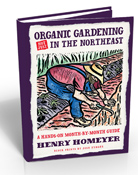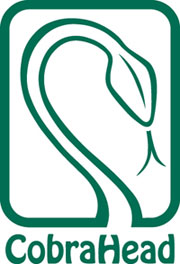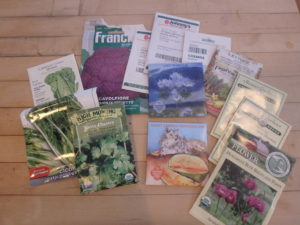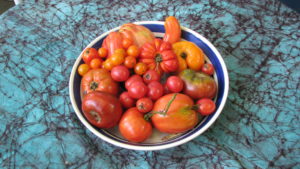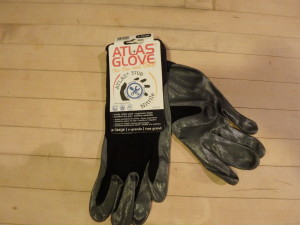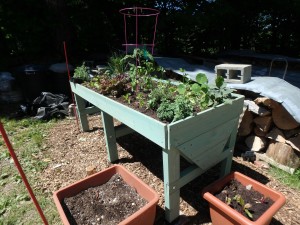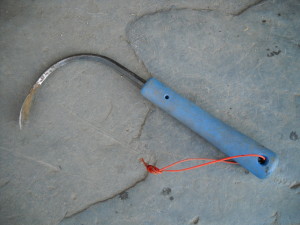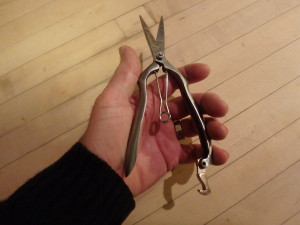Getting Ready to Plant Seeds
Ground Hog’s Day has come and gone. That means we’re coming down home stretch. Winter is more than half gone. It’s time to think about ordering seeds, if you haven’t yet.
I know that many great gardeners just don’t bother starting seedlings indoors. They say it takes too much time and effort. And now days, there are great nurseries in most areas that produce all kind of fine heirloom tomatoes and crunchy red lettuces. But I love to pamper my little tomato seedlings under lights, watering and fussing over them every day. It helps me stay sane. Of course it’s still too early for most things.
I love ordering specialty seeds and trying new things each year and look forward to the catalogs. Many of the seed companies are now depending on our ability to choose seeds and order them on-line. I love the old fashioned seed catalogs, catalogs I can hold in my hand and study at my leisure – even in the bath tub.
I recently got a catalog from Seeds of Italy, an importer in Nebraska. Dan Nagengast, the co-owner, worked in West Africa with me decades ago so I decided to give him a call to talk seeds. What are some of his best tasting tomatoes, I asked? He says his most popular tomato is one called Red Pear. Unlike American pear tomatoes, this is a big one: 8 to18 ounces. Great flavor, and meaty with few seeds.
Another tomato I am ordering from Seeds of Italy is an old French one called Marmande. It’s said to have good fruit set even in cool weather, and is described as “semi-determinate”. Determinate tomato plants grow to a certain size, set fruit, and stop growing. Indeterminate tomatoes keep growing until frost or disease kills them. But semi-determinate? I’ll grow these, and find out just what they do. Dan said another favorite is St Pierre, an indeterminate heirloom with great flavor.
As you go through your catalogs or read them on-line, you might be confused by the term heirloom. Heirloom means that the plant stays true to its characteristics year after year. They breed true, so you can save seeds. Baker Creek Heirloom Seeds is the biggest heirloom seed producer in America, offering some 1800 heirloom varieties. They have more weird veggies than you can shake a stick at!
Hybrid tomatoes, in contrast, result from crossing two different varieties of tomatoes. The first generation after crossing them yields a plant that has characteristics of both parents and is generally superior to both. If you save seeds, you’ll get progeny that are like the original parents as well as some of the hybrid you wanted. But you can’t tell what the seedlings will produce, so it’s not recommended.
Another seed company I like is Hudson Valley Seed Company. They are new in the marketplace, just eight years in existence. Co-owner Ken Greene started it as a seed library – a service offered to library patrons in Gardiner, NY. Library members could get free heirloom seeds, grow plants, save seeds and then pay back the library with seeds they saved. Obviously, an important education component was part of the process as many plants will hybridize on their own unless spaced appropriately.
No longer a seed library, Hudson Valley Seed Company is certified organic. When Ken Greene came to my part of the world this winter, I bought a few seeds including one for cold-weather watermelons that originally came from Russia. Watermelons are not usually a big success in New Hampshire, so it will be good to see what they will produce.
Johnny’s Selected Seeds of Winslow, Maine is one of my favorites. They are the go-to company for many farmers around the country because their seeds are always top quality, and they have just about every type of seed one could want. Home gardeners can benefit from the extensive cultural information they provide on their website or in their catalog.
Unlike some seed companies, Johnny’s does research and development at their home base in Maine. Obviously they have growers who produce much of their seed, but I am confident that their seeds are good for my climate, not somewhere down south. It is also an employee-owned business. The sell both organic and conventional seed.
You may wonder about the advantages of buying organic seed. Yes, it costs a little more, but by buying organic seed you are supporting farmers who treat the soil and environment with care and respect – just like you do. If you are an organic gardener, you probably will want organic seeds because the mother plants have survived and thrived without chemicals – just like they will have to do at your house.
High Mowing Seed Company of Vermont is a company that only sells organic seeds. And unlike many seed companies, they ship free if you order over $10 worth of seeds. Renees Garden Seeds is another one of my favorite seed companies, with many organic seeds.
Lastly, check out the Seed Savers Exchange. This is a non-profit that since 1975 has been collecting, saving and selling heirloom seeds. Join so you can access their amazing collection of heirloom seeds.
Henry may be reached at henry.homeyer@comcast.net. See his blog posts at https://dailyuv.com/
Holiday Gifts for the Gardener
It’s that time of the year again: time to figure out good gifts for Uncle Albert and your sister Sadie. If they’re gardeners, gifts are easy to pick. There are plenty of items that cost from $5 to $300, and generally, one size fits all. Let’s look at some things I have used and like.
After giving a talk at the Milford, NH Garden Club recently, I bought some gardening gloves that were being sold as a fund raiser. These cost me just $5, and have already earned their keep. These are nitrile gloves made by the Atlas Glove Company. They have a waterproof palm and a stretchy, breathable fabric back. I have big hands, and the x-large size was perfect. Mine are black with silver palms, but the smaller sizes come in a variety of colors.
I don’t generally wear gloves when gardening, as most are too thick – and I like the feel of the soil – but in cold weather I do wear them. These are thin enough that I can go easily in my pants pocket and pull out my pocket knife, or feel a tender weed. The nitrile glove is the Atlas 370B series. I’ve also used a thicker Atlas glove with a natural rubber palm, the 300 series. These are both available at most gardening centers.
Does your loved one start plants by seed? Gift cards at garden centers or seed companies are nice. I get my seeds from several places: the Hudson Valley Seed Library, Johnny’s Selected Seeds, High Mowing Seeds, Renees Garden and a young company in New York State, Fruition Seeds. All have wonderful selections.
One of my favorite additions to my garden this year was a “VegTrug” from Gardener’s Supply Co. (www.gardeners.com, Item#8586918). This is a stained cedar planting box on legs, about 6 feet long and 32 inches wide that retails for $279, with free shipping. It is V-shaped in cross section with the deepest portion 16 inches deep – deep enough for potatoes or tomatoes. It stands 32 inches tall, so no bending is needed to weed or to pick.
In my VegTrug I grew one patio tomato and pretty much every kind of herb: basil, dill, marjoram, thyme, sage, purple sage, chives, oregano and parsley. I even had a nasturtium cascading over one end.
One reason I loved my VegTrug was the convenience: it allowed me to have herbs near the house in a spot not otherwise suitable for growing. And the plants grew well, although in the heat of the summer they dried out more quickly than my garden near the stream, so I watered pretty much every sunny day. It uses 380 liters of soil mix, so I made my own, a 50-50 mix of peat moss and compost. The bottom is slotted for drainage, but it comes with a woven liner to prevent soil from washing away.
Every gardener needs a good weeding tool, and every year I recommend the CobraHead Weeder, because I believe it is the best weeding tool available. This tool has a single tine that is curved like the shape of a rising Cobra. I use it to tease out grass roots, to get under large weeds (so I can loosen the soil below them and pull from both top and bottom of the weed at the same time), and for preparing soil to plant. Now it seems a part of my right hand (though it is right-left neutral). At under $25 locally or from the manufacturer (a family business found at www.CobraHead.com), this tool is tough, strong, and made in the USA.
Every year I try to learn more about growing healthy plants. This year I paid $50 to join the Bionutrient Food Association (http://bionutrient.org/), and would like to suggest giving a membership as a nice present. One of the goals of the non-profit is to educate members about how to grow food that is nutrient-rich.
Much commercial agriculture depends on adding just 3 minerals to the soil (nitrogen, phosphorus and potassium) and basically ignoring the other nutrients that plants – and humans – need to be healthy. Growing vegetables year after year removes micronutrients from the soil that need to be replaced. The BFA offers information and workshops that I believe will help me to grow better food and stay healthy.
Weeds are the bane of many gardeners. One way to minimize their presence is to weed daily, mulch, or to put down weed mats. A Vermont company, Garden Mats (https://gardenmats.com) produces heavy-duty woven mats with pre-cut holes in a variety of patterns for different vegetables. I’ve used them – and re-used them. They keep down weeds, hold in some moisture, but also breathe and let rain penetrate. They are 4 feet wide and come in lengths of 6, 12 and 18-feet for a cost of $11 to $31. They are definitely a labor-saver, and they claim the mats increase yields 10% to 20%, too. I like them, and also the fact that it is a small, family-owned business.
The last item for this year’s list is a lovely pair of stainless-steel garden shears for cutting flowers, herbs, and for use in the kitchen. Made in England, these shears are elegant as well as sturdy, and are said to be designed for small hands. Sold by Gardeners Supply (Item#8593404), they retail for $60 and come in a handsome gift box.
Santa, if you’re listening, I have everything I need. So you can just volunteer to come work in my garden next summer. I know it’s the off-season for you, and we both need to lose some weight, anyhow. We can pull weeds and eat cukes.
Read Henry’s blog at https://dailyuv.com/gardeningg

